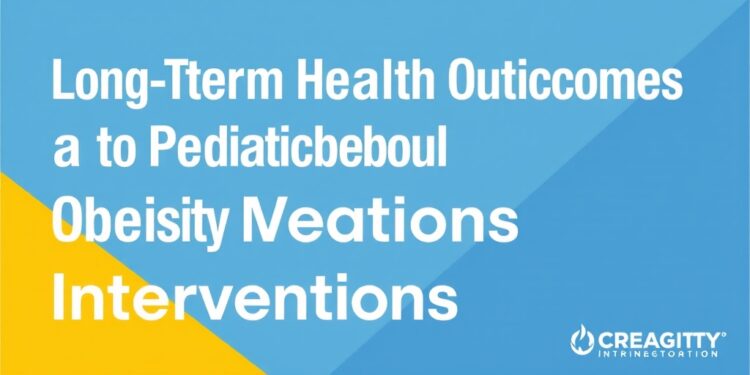
The rise in pediatric obesity has become a significant public health concern in recent years, drawing attention from researchers, healthcare professionals, and policymakers alike. Given the alarming statistics surrounding childhood overweight and obesity, it is imperative to evaluate effective treatments that contribute to long-term health benefits. This cohort study shines a light on the positive impact of pediatric obesity treatment, establishing a clear association between improved health outcomes and reduced long-term morbidity, including diabetes, dyslipidemia, and hypertension.
The research findings indicate that a positive response to obesity treatment during childhood is not just a fleeting success but has substantial implications extending into young adulthood. Specifically, children who received effective obesity treatment demonstrated a lower risk of mortality in early adulthood compared to their peers who did not undergo treatment. This significant finding emphasizes the critical need for early intervention in managing pediatric obesity, highlighting the protective effects that proper weight management can offer.
Furthermore, while the study showcases the impressive health outcomes related to successful obesity treatment, it also draws attention to an important aspect of children’s psychological well-being. Interestingly, these benefits in physical health were not mirrored in mental health outcomes, as effective obesity treatment showed no correlation with reducing rates of adult depression or anxiety. This disconnect urges further examination, as it reveals the complexities of childhood obesity’s impact on mental health, suggesting that physical health interventions alone may not suffice to address psychological challenges.
As the healthcare community seeks to streamline approaches for managing pediatric obesity, this study underscores the necessity of a comprehensive treatment strategy that addresses both physical and mental health needs. Effective interventions should consider the multi-faceted nature of obesity and its association with mental health outcomes whilst ensuring a sound approach to nutritional education, lifestyle modifications, and psychological support.
Additionally, the prominence of concurrent conditions such as type 2 diabetes, dyslipidemia, and hypertension in individuals facing obesity necessitates a robust framework for monitoring and managing these health concerns. The evidence suggests that addressing obesity in children can lead to significant improvements not only in weight management but also in the prevention of chronic diseases later in life. This longitudinal perspective is crucial in shaping healthcare policies and initiatives focusing on pediatric populations.
Moreover, as the study indicates, early intervention can have far-reaching effects, not just on physical health metrics, but also on overall quality of life. Families that engage in obesity treatment programs set positive lifestyle habits early on that can combat not just obesity, but the associated stigma that young people often face. This supportive environment facilitates the development of a healthier mindset while also promoting family cohesion and collective health efforts.
The findings of this cohort study also raise important questions about the accessibility and effectiveness of treatment programs available for pediatric populations across diverse socioeconomic backgrounds. The challenge remains to ensure that all families have equitable access to resources and interventions that can significantly improve health outcomes. Thus, addressing disparities in healthcare accessibility can play a pivotal role in the fight against pediatric obesity and its associated risks.
As discussions around pediatric obesity evolve, the findings further emphasize the critical role of healthcare providers in monitoring childhood obesity. Regular screenings, counseling, and tailored interventions based on individual needs highlight the importance of personalized healthcare in mitigating the risks associated with obesity. This approach not only empowers families but also equips healthcare professionals with the necessary tools to foster long-lasting health changes in young patients.
As the body of research surrounding pediatric obesity continues to grow, it underscores an essential narrative: successful treatment during childhood can lead to healthier adults. However, this narrative must be communicated effectively to all stakeholders involved, from healthcare providers to policymakers, to foster an environment that prioritizes and supports early intervention strategies. Doing so can ensure that future generations experience a reduction in obesity-related health challenges.
Overall, the implications of this study are profound and multifaceted, serving as a clarion call for a united front in addressing the growing childhood obesity epidemic. The intersection of physical and mental health, coupled with the need for equitable healthcare access, presents a complex yet attainable goal for public health efforts. Thus, fostering a collaborative approach will be vital in ensuring that children not only achieve successful obesity treatment but thrive in all dimensions of health.
Through continued research, open dialogue, and dedicated intervention strategies, the battle against pediatric obesity can potentially shift towards a healthier future for children and adolescents alike. The findings delineate a crucial understanding that effective obesity treatment is not merely about achieving a healthy weight but rather redefining the standards of holistic health for future generations. For a healthier tomorrow, comprehensive strategies in managing pediatric obesity should remain at the forefront of public health discussions and practices.
In summary, this impactful study provides substantial evidence that links effective pediatric obesity treatment with favorable long-term health outcomes. The importance of early intervention cannot be overstated. By prioritizing treatments that not only address physical health but also consider mental health and address inequities in healthcare access, society can foster a positive trajectory towards health and wellness for all children.
Subject of Research: Pediatric obesity treatment and its long-term health outcomes
Article Title: Impact of Pediatric Obesity Treatment on Long-Term Health Outcomes
News Publication Date: October 2024
Web References: [Link Pending]
References: (doi:10.1001/jamapediatrics.2024.5552)
Image Credits: [Pending Attribution]
Keywords: Pediatric obesity, long-term morbidity, diabetes, dyslipidemia, hypertension, treatment outcomes, mental health, intervention strategies, public health
Tags: childhood obesity interventionschronic disease preventiondiabetes preventiondyslipidemia managementearly intervention strategieshealthcare accessibilityhypertension risklong-term health outcomesmental health outcomespediatric obesitypsychological well-beingsocioeconomic disparities





